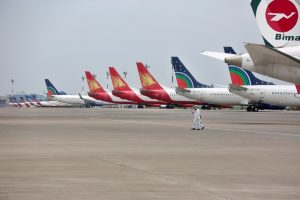Mostafa Kamal MajumderWith the budget session of Parliament just 10 days away, the overtures made by the government and the Opposition centring on the same give one the impression that they want to find a way to the next general elections on their own terms, although they talk about their readiness to make some concessions.The statement of Khondakar Mahbub Hossain, adviser to BNP’s chairperson Begum Khaleda Zia that they might be prepared to accept the incumbent Prime Minister Sheikh Hasina as the head of the election-time interim government if she give up executive powers before the polling, has been viewed by many as an indicator.
Apparently this remark was made in response to a statement made by the general secretary of the AL
Syed Ashraf Hossain who dropped hints at accommodating somebody other than the Prime Minister as the head of the interim government that would oversee the next general elections if the Opposition so agrees.
Khondakar Mahbub Hossain however, reiterated that their party still stood for non-party caretaker government to hold free and fair elections. Another adviser to the BNP chairperson Shamsuzzaman Dudu has said that the question of restoring non-party caretaker government to oversee elections would be settled on the streets.
Some Awami League leaders including presidium member Mohammad Nasim have said on the other hand that the next election would be held under the incumbent Prime Minister as per the provisions of the present Constitution.
It is to be noted that the MPs belonging to the opposition would join the budget session beginning on June 3, if not for anything else, to make sure that absence from the house does not exceed 90 days in which case they will face disqualification as members. Already their absence has totalled 83 sitting days, parliament secretariat sources has said to journalists.
Against this backdrop the calling of elections of the city corporations of Sylhet, Barisal, Rajshahi and Khulna is seen as a move from the government to create election tempo in the country as against the opposition movement of based on general strikes and demonstrations which of late have also been restricted through the imposition of a month-long ban.
Political observers however find the BNP and its allies taking keen interest in the city corporation elections in which they believe they have good prospects. For the government these elections would give an opportunity to test its popularity among the people, as the general elections are not far away.
Insiders say that the main opposition BNP has started taking interest in the national elections too because, in the opinion of its senior leaders, their popularity among the voters has increased remarkably ‘in view of many debacles that the people faced’ during the last four years and a half of rule of the grand alliance government. The hard line stance of the ruling alliance against the BNP and its allies – reflected through the mass arrest of their leaders and workers all over the country in the wake of the latest spate of movement – have come has been taken with caution by the latter as charges have been framed in hartal violence cases against many of them.
Yet opposition leaders are now talking less about their complaint of politicisation of the administration and some vital institutions, and are instead trying for a change through elections. BNP leaders are against intervention by in the political process by any third party because of their unhappy experience of the last caretaker government. They thus might be ready to make all concessions but press for deployment of the armed forces to oversee the maintenance of law and order during the polling. (First Published in The New Nation, Dhaka on May 24, 2013)



